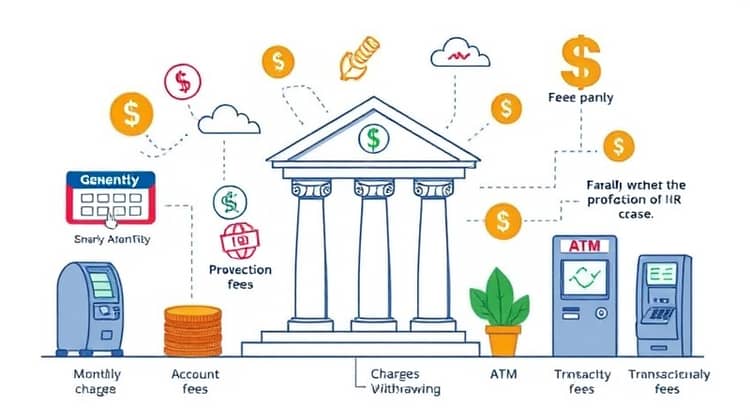In today's fast-paced business environment, the right banking solution can significantly impact your success. Understanding your company's unique needs and the various banking options available is crucial for making informed decisions. Whether you're just starting or looking to expand, it's vital to assess how banking can enable your business goals.
Choosing the perfect banking partner is not just about accessing funds; it's about finding a service that aligns with your operational needs. A well-structured banking framework can help you manage your finances effectively, make transactions easily, and provide valuable resources for growth.
This article will guide you through essential considerations when banking for your small business, from understanding your needs to exploring account types and technology solutions. Let's dive into the various aspects that will help you make effective banking decisions.
1. Assess Your Business Needs

The first step in selecting a banking solution is to thoroughly assess your business needs. Each business operates differently based on its size, industry, and financial goals, so understanding your unique situation is essential. This assessment will help you identify the types of services you require and how you intend to use banking to facilitate your operations.
Consider the volume of transactions your business will conduct, the currencies involved, and the speed at which you need access to your funds. Understanding these dynamics will guide you in selecting the right banking services that can cater to your specific requirements.
- Determine the nature of your business transactions
- Evaluate your cash flow patterns
- Consider your future expansion and financial goals
This step lays the foundation for selecting the right banking services that can efficiently support your operations and growth.
2. Types of Accounts

Small businesses typically require three main types of accounts to manage their finances effectively. Each account type serves a distinct purpose suitable for different financial activities, and knowing these can help you make the right choice.
Business checking accounts are essential for day-to-day operations, while savings accounts help manage extra funds. Additionally, merchant services accounts allow businesses to process credit card transactions. Understanding how these accounts work together can optimize your financial management.
Selecting the right types of accounts can streamline your financial processes and ultimately save you money in fees and costs.
a. Business Checking Accounts
Business checking accounts provide a safe and convenient way to manage your company's day-to-day transactions. These accounts allow you to deposit and withdraw funds, pay bills, and make purchases, supporting your daily financial functions.
When choosing a checking account, consider factors like transaction limits, monthly fees, and any additional features. Some banks offer perks such as online banking, mobile deposits, and free ATM access, which can significantly enhance your banking experience.
It’s also helpful to assess the bank’s reputation, reliability, and customer service quality to ensure that they can adequately support your business needs. You want a bank that will be there for you every step of the way.
- Low or no monthly fees
- Unlimited transaction capabilities
- Online banking and mobile app access
Choosing the right business checking account is vital to maintaining smooth daily operations.
b. Business Savings Accounts
Business savings accounts complement your checking accounts by offering a secure space to grow your extra funds. These accounts typically earn interest, which is added to your balance over time, helping your business build a financial cushion for unexpected expenses.
Having a separate savings account can help in managing your cash concerns and preparing for future expenditures. It's essential to consider the interest rates and any fees associated with these accounts when making your decision. Additionally, look for easy access to your funds should you need to withdraw during emergencies.
- Interest-earning potential
- Emergency fund management
- Easy transfer to checking accounts
A savings account provides your business with added financial security and flexibility.
c. Merchant Services Accounts
Merchant services accounts are crucial for businesses that accept credit or debit card payments. These accounts enable businesses to process transactions seamlessly, boosting customer satisfaction and potentially driving more sales. It’s important to choose a provider that offers competitive rates and reliable service.
Integrating a merchant services account into your business can simplify the payment process, reduce fraud risk, and provide analytical tools to better understand your sales patterns.
- Credit card payment processing
- Point of sale systems
- Fraud protection tools
Selecting the right merchant services account can enhance your customer experience and streamline financial transactions.
3. Technology and Online Banking

In the digital age, technology is integral to Banking for small businesses. Online banking platforms provide 24/7 access to your accounts, enabling you to perform transactions, pay bills, and monitor your finances at your convenience.
Additionally, mobile banking apps allow for managing finances on the go, making it simpler to track spending and engage in real-time transactions. Innovative financial technology solutions can also automate processes such as invoicing and expense management, leading to more efficient operations.
Understanding the technological offerings of your bank is critical for optimizing your banking experience. Assess the security features available and ensure they comply with the latest standards to protect your business finances.
4. Fees and Costs

When selecting a banking solution, it’s imperative to understand the various fees and costs associated with different accounts and services. Monthly maintenance fees, transaction fees, and ATM charges can add up quickly, impacting your overall profitability.
Ensure that you carefully review and compare the fees associated with different accounts to choose an option that is transparent and fair.
- Monthly account fees
- Transaction charges
- ATM withdrawal fees
By being aware of these costs, you can select a banking solution that minimizes fees and maximizes your profits.
5. Loan and Credit Options

As your business grows, you may require access to capital through loans or credit options. Understanding the lending products your bank offers, such as lines of credit and small business loans, is essential for managing growth effectively.
Consider the terms, interest rates, and repayment options associated with these products, as they can significantly impact your financial health. Make sure to select the types of financing that align with your business strategy and financial objectives.
- Small business loans
- Lines of credit
- Equipment financing
Choosing the right loan and credit option can provide the necessary support for your business's continued expansion.
6. Customer Service and Support

When it comes to banking, customer service and support can be just as important as the financial products offered. You want a bank that provides adequate support and is responsive to your needs and concerns.
Having access to knowledgeable representatives who can assist with issues or answer questions can make a significant difference in your banking experience.
- 24/7 customer support availability
- Dedicated business banking representatives
- User-friendly online support resources
Prioritizing customer service ensures that you have assistance when vital issues arise, fostering a better banking relationship.
7. Compliance and Documentation

Ensuring compliance with various regulations is a critical aspect of small business banking. Understanding the documentation your bank requires, including tax identification numbers and business licenses, is essential for smooth account openings and transactions.
Proper compliance can prevent unwanted issues and streamline your interactions with financial institutions, allowing you to focus on running your business.
- Tax identification number
- Business licenses
- Personal identification for account holders
Being organized with your documentation will facilitate the banking process and foster positive relationships with your banking partner.
Conclusion

Navigating the world of small business banking can sometimes feel daunting, but with careful consideration and planning, you can find solutions that align with your business needs. Understanding the various types of accounts available, the importance of technology, and being mindful of fees will enhance your banking experience.
Additionally, strong customer support and compliant documentation practices can save you time and prevent issues down the line. By prioritizing these factors, you'll set your business up for financial success and stability.
Remember that your banking partner should serve as a resource and support for your operations and growth. The right banking choices can streamline your finances and provide the necessary tools for sustained success.














